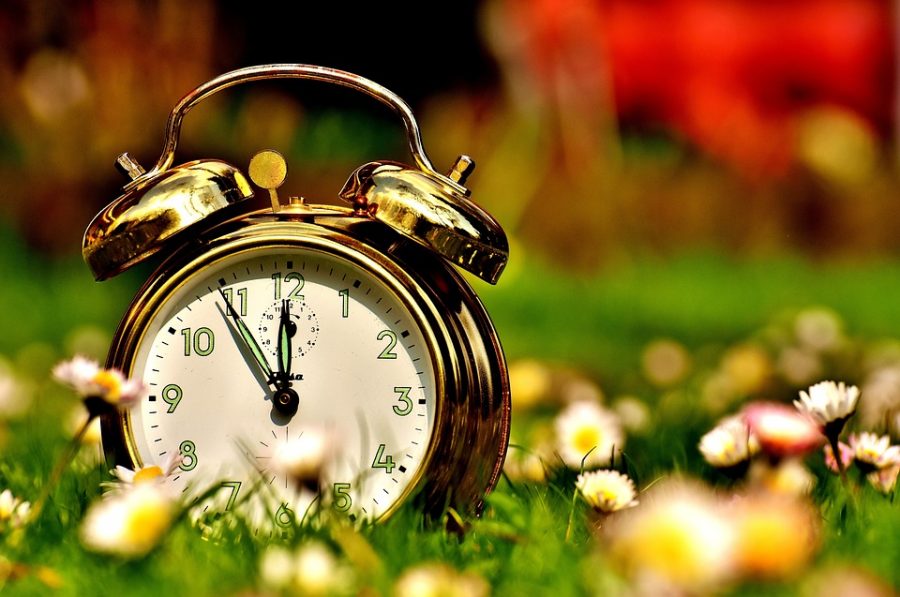 Telling the time in English is easy once you understand how English speakers refer to the different parts of the clock at different times of the day. It always follows the same pattern. So once you know how it works, you can confidently announce the time at any time of the day or night.
Telling the time in English is easy once you understand how English speakers refer to the different parts of the clock at different times of the day. It always follows the same pattern. So once you know how it works, you can confidently announce the time at any time of the day or night.
You might know your numbers in English, but you need more than numbers to tell the time in English. You also need to be able to ask and answer questions about time and speak about the clock in different life situation.
Read on to find out more about telling the time in English using the 12 hour clock and the 24 hour clock, which prepositions to use, how to ask the time, how to give the time and how the time is used commonly to talk about the working day. We’ve also included a list of idioms and common phrases using the word ‘time’.
Vocabulary for telling the time in English
O’Clock, ‘Past’ and ‘To’
For hourly times use the phrase ‘o’clock’. For example: It is three o’clock (pronounced: ‘three oh clock’)
For any minute past the hour but before the half hour, use the word ‘past’ before the previous o’clock, or read out the full numbers.
- The phrase ‘o’clock’ is a shortening of the phrase ‘of the clock’. This is to differentiate it from when we used to tell time by the position of the sun and stars. We always pronounce ‘o’ in this phrase as ‘oh’. In English, we sometimes call zero ‘0’, pronounced ‘oh’, which is faster and easier than saying ‘zero’.
Examples using ‘past’:
- five past three (3.05) – or three-oh-five
- ten past three (3.10) – or three-ten
- Quarter past three (3.15) – or three-fifteen (sometimes people say ‘fifteen minutes past’, but never just ‘fifteen past’)
- Twenty past three (3.20) – or three twenty
- Twenty-five past three (3.25) – or three twenty-five
- Half past three (3.30) – or three thirty
For any minute beyond the half hour, use the word ‘to’ before the next o’clock.
Examples using ‘to’:
- Twenty-five to four (3.35) – on BBC radio, the presenters often say ‘five-and-twenty-to’ (or five-and-twenty-past’) instead of twenty-five-to/past
- Twenty to four (3.40) – or three forty
- Quarter to four (3.45) – or three forty-five
- Ten to four (3.50) – or three fifty
- Five to four (3.55) three fifty-five
The 12 hour clock and AM / PM
When we tell the time in English, we can use the 12 hour clock or the 24 hour clock.
The 12 hour clock splits the day into two 12 hour sections. One lasts from midnight to noon and the second half lasts from noon to midnight.
In the 12 hour clock, we need a way to differentiate between morning and evening, so we use the letter ‘am’ and ‘pm’ to show whether 11.20 is in the morning or at night.
Hours before noon are called ‘a.m.’ (pronounced ay-em), which comes from the Lain ‘ante meridiem’, which means before midday.
Hours after noon are called ‘p.m.’ (pronounced pee-em), which comes from the Lain ‘post meridiem’, which means after midday.
Often we write these shortenings without the full stops in between the letters, so they are often written in common usage as ‘am’ and ‘pm’.
So 11.20 in the morning is 11.20 am (eleven twenty or twenty past eleven)
and 11.20 at night is 11.20 pm
The 24 hour clock
If we use the 24 hour clock to tell the time in English, there is no need to use ‘am’ and ‘pm’. This is because 11.20am is simply 11.20, and 11.20 pm is 23.20.
When we get past 12 noon the time does not go back to 1, but instead moves onto 13, often written with an ‘h’ after the number, for example 13h.
In Britain we often use the 12 hour clock (except for transport timetables when the 24 hour clock is always used) but in other European countries it is common to use the 24 hour clock in social situations when writing about the time. Here the suffix ‘h’ is often used, for example 14h or 14.30h. However when speaking, the 12 hour clock is always used.
When it is in the morning and there is only a single digit number in use (e.g. one through to nine) the 24 hour clock uses a zero first in formal situations, such as a train timetable, for example, 08.30.
Examples from the train timetable above:
The first train departs London Euston at 0640 (six forty, twenty to seven, or 6.40 am) and arrives at Watford Junction at 0655 (six fifty-five, five to seven, or 6.55 am)
The train that departs from Birmingham International at 1739 (seventeen thirty-nine, five thirty-nine, 5.39 pm, or twenty-one minutes to six) arrives at Birmingham New Street at 1751 (seventeen fifty-one, five fifty-one, 5.51 pm, or nine minutes to six).
The last train to depart Milton Keynes Central at 2248 (twenty-two forty-eight, ten forty-eight, 10.48 pm, or twelve minutes to eleven) arrives at Coventry at 2352 (twenty-three fifty-two, eleven fifty-two, 11.52 pm, eight minutes to midnight/twelve).
- If we want to read out the time using the 24 hour clock, instead of using ‘o’clock’ we can say ‘hundred hours’. For example, 14:00 would be ‘fourteen hundred hours’. For 0800 we can say ‘oh eight hundred hours’. Each digit is pronounced. This usage is rare in every day speech though and would normally only be used in specialist situations, such as in the military. This is why the 24 hour clock is sometimes called ‘military time’.
How to separate the numbers when writing the time?
Some people use a dot as punctuation to separate the numbers when writing a digital time (2.30 pm), other people use a colon (14:30) – colons are especially popular in 24 hour clock format.
Sometimes people use nothing at all to separate numbers using the 24 hour clock (1430). Whichever format you chose when writing the time in English, try to keep it consistent.
Examples of telling time in English with an analogue clock
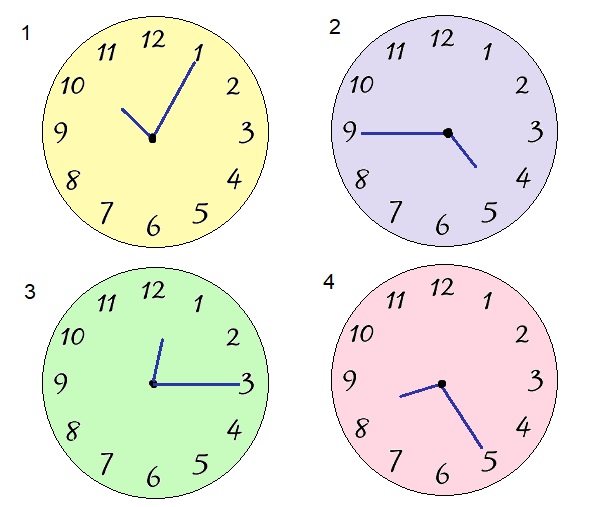 Consider the clock faces on the left. Here, the first clock can show: five past ten / ten o five / 10.05 / 22.05
Consider the clock faces on the left. Here, the first clock can show: five past ten / ten o five / 10.05 / 22.05
The second clock shows: four forty-five / quarter to five / 4.45 am / 4.45 pm or 04.45 / 16:45
The third clock shows: quarter past twelve / 12.15 am / 12.15 pm / 00.15
The fourth clock shows: twenty-five past eight / 8.25 am / 8.25 pm / 20.25
- When it is 5 minutes past the hour, we never say the numbers only (‘six five’) we would have to say ‘six oh five’, using the sound ‘oh’ to represent the zero for 6.05. More commonly, we would say ‘five past six’.
- We only tend to use ‘to’ or ‘past’ with minutes that are multiples of five (e.g. ’10 to five’, ’20 to five’, 25 past four’) but ‘quarter to’ and ‘quarter past’ when it is 15 minutes, and ‘half past’ when 30 minutes.
- We would always say the word ‘minutes’ after the o’clock if it is not a multiple of five. For example, we would say ’17 minutes past 5′ and ’23 minutes past 5′.
Prepositions for telling the time in English
We normally use the preposition ‘at’ with times for making plans for a specific time. For example, ‘I am meeting them at two o’clock’.
But we use the word ‘in’ for a less definite amount of time. For example, ‘I am meeting them in two hours’. This implies a a more general time.
How to talk about the general time of day
We use the preposition ‘in’ for a general time of day. For example ‘in the morning’, ‘in the afternoon’ and ‘in the evening’.
If it is late, we normally say ‘at night’, for example ‘it’s ten o’clock at night’ to mean 10 pm. We also say ‘in the night’ to mean in the middle of the night in general.
We can add the phrase ‘in the morning’ to mean a time before noon. If the time is very early, for example before 6am, we can say ‘early morning’. If the time is in the middle of the night, for example 1 am until 3 am, we can say it is ‘in the early hours’.
- ‘At the crack of dawn’ means very early in the morning, just as daylight is breaking. (For example: “You’ll have to be up at the crack of dawn to get there in time for lunch”)
We say ‘in the afternoon’ for a time between noon and 6 pm, and ‘in the evening for a time after around 6 pm. The phrase ‘at night’ starts to be used later on, after around 9 pm. People might use the word ‘afternoon’ later in the summer because it stays light later.
Other general times would be ‘around 3pm’ or ‘around noon’. For example, someone might ask you: “What time are we meeting tonight?” You could reply: “Around 6pm” or “About half seven”
For general amounts of time, we can use various phrases that aren’t exact, often starting with ‘about’ or ‘around’. For example:
- ‘It will take about half an hour’ / ‘about 30 minutes’
- ‘I’ll meet you in about a quarter of an hour’ / ‘about 15 minutes’
- ‘We’ll be there in about an hour’
- ‘It should be about an hour and a half’ / ‘about 90 minutes’
- ‘It will only take a few minutes’
- ‘They will be ready in a couple of minutes’ (a couple means two, but people sometimes use ‘couple’ to mean slightly more when talking about time or quantity)
Daylight saving time
At the start of spring, we put the clocks forward one hour to British Summer Time (BST). At the start of winter, we put the clocks back one hour again. This habit of changing the clocks back and forth is in order to use the daylight more effectively. Find out more about changing the clocks and Daylight Saving Time.
How to ask the time in English
There are a few phrases that we can use to ask the time. Here are some examples:
- Can you tell me the time, please?
- Could you tell me the time, please?
- Excuse me, do you have the time?
- Have you got the time?
- Do you know the time?
- Do you know what the time is?
- What’s the time?
- Got the time?
- Although ‘got the time?’ is an informal and direct way of asking someone the time, this is similar to another phrase ‘have you got time?’ which means ‘do you have enough time (to do something)’?
To answer someone else’s question and give them the time, we need to use the word ‘it is’ or more commonly, ‘it’s’ to introduce the time.
For example:
- It’s four o’clock
- It’s half past two
- It’s about seven
- It’s exactly eight o’clock
- It’s around ten thirty
- It’s 1.05 (‘one oh five’)
If you can’t help them, you might want to say:
- Sorry, I don’t have the time
- I’m sorry, I don’t have my watch on
- Sorry, I’m not wearing a watch
- I’m sorry, I can’t see the clock from here
Time used to describe the working day
There are a few phrases we use related to time in English speaking countries. Traditionally the ‘working day‘ is called ‘9 to 5’. This means 9 am until 5 pm. These are the opening hours of most shops. (Many shops in the UK now regularly open until 5.30pm or 6pm. There is also often a ‘late night shopping’ day once a week when shops will open until 8pm or 9pm).
The hours of 9 to 5 from Monday to Friday are often called ‘office hours’. Of course, office hours today can also mean until 6 pm or later, but traditionally it was always from 9 in the morning until 5 in the afternoon/evening.
These office hours were also used in the famous film and song by Dolly Parton ‘9 to 5’ where she sings ‘working nine to five, what a way to make a living’. The phrase ‘to make a living’ means to earn money.
The phrase is used in the song in a negative way to imply working hard for little pay and for someone else’s benefit.
As Dolly sings in ‘9 to 5’:
‘Tumble outta bed and I stumble to the kitchen
Pour myself a cup of ambition
Yawn and stretch and try to come to life
Jump in the shower and the blood starts pumpin’
Out on the street the traffic starts jumpin’
With folks like me on the job from 9 to 5′
‘Workin’ 9 to 5, what a way to make a livin’
Barely gettin’ by, it’s all takin’ and no givin’
They just use your mind and they never give you credit
It’s enough to drive you crazy if you let it’
‘9 to 5, for service and devotion
You would think that I would deserve a fat promotion
Want to move ahead but the boss won’t seem to let me
I swear sometimes that man is out to get me!’
Other phrases related to work are ‘full time’ and ‘part time’. A full-time job usually means a job that you do every day for around 40 hours per week.
A part-time job means a job that that you do for fewer hours than a full time job. This might be three days a week or perhaps four hours per day, instead of the usual eight hours per day for a full-time job.
If someone is ‘taking time off’, it means they are taking a break from work or study.
Phrases and idioms using the word ‘time’
Other phrases with the word ‘time’ include:
Having the time of my life – having an amazing time (‘Are you enjoying the concert?’ ‘Yes, I’m having the time of my life!’)
A race against time – a situation where you have to rush to finish something (‘It was a race against time to finish the essay before the deadline’)
Time will tell – the passing of time will show the result (‘Only time will tell whether Brexit is a good or bad thing for the UK’)
To be / run out of time – to have no time left, when you have missed a deadline or come to the end of a time limitation (“I didn’t finish the exam – I ran out of time”); to be out of step with the musical rhythm (“He is a terrible dancer, he is always out of time”)
To be running out of time – to have little time left (“Hurry up, you’re running out of time”)
Take your time – don’t hurry (“Take your time – there’s no rush, there’re not expecting us until 9pm”)
Taking your own sweet time – taking a long time to do something (“He’s taking his own sweet time about it, isn’t he? The job should’ve been finished on Tuesday”) – usually said with annoyance about someone when they are taking too long to do something.
Behind the times – old-fashioned, not up-to-date (‘He can’t even use a computer; he’s really behind the times’)
To have time – Do you have enough time (to do something)? (“Have you got time to help me fix the car?” / “We could drop them off at my house first, if we’ve got time”)
In the nick of time – at the last moment, just before the deadline (‘I caught the train in the nick of time, seconds before it left the station’)
To stand the test of time – to continue successfully for a long time (This film is still relevant today – it has really stood the test of time’)
To have time on your hands – to have a lot of spare time, to have too much free time (‘He is always gossiping with his colleagues – he must have a lot of time on his hands’)
Time flies – time passes quickly (‘time flies when you’re having fun’ – this is a common idiom used to describe something that is so enjoyable that time feels like time passes more quickly than it really does)
Taking time off – taking a break from something (“I won’t be at work next week, I’m taking some time off”)
From time to time – occasionally, now and then, every so often (‘”He visits his friends in London from time to time”)
Let us know your thoughts about time
Hopefully you feel more confident about telling time and talking about time in English. Do let us know if you have any other time-related questions or anything else you want us to over on this page.
Are you comfortable using am and pm, 24 hour clock and military time?
What other time-related phrases or idioms have you heard?
Do you find telling the time difficult in English? Do you have any tips for non-native speakers?
Which time-related words or phrases do you find most confusing?
Share your thoughts in the comments!

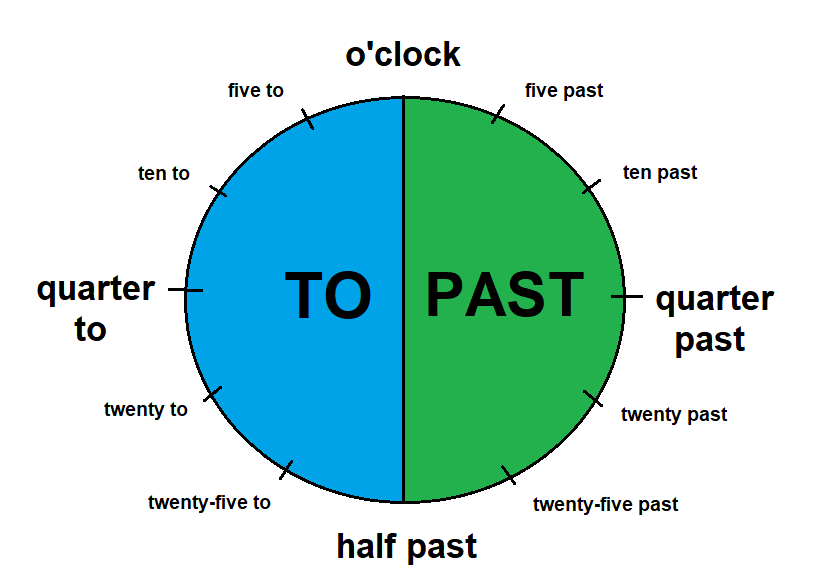
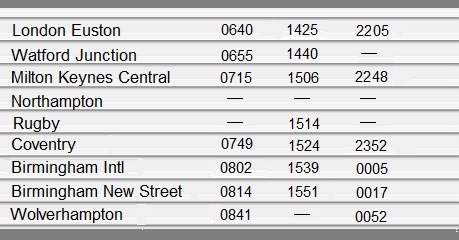
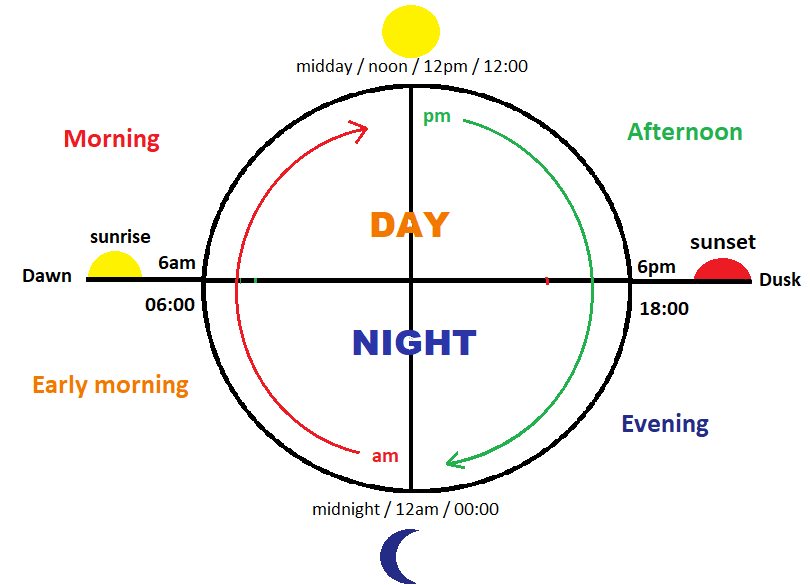
It is too difficult and make me headache.
So sorry to hear that, Sandy! Is there any specific area of telling the time in English that you need help with? If you are finding it difficult to understand the various ways to say the time, simply stick to saying the numbers. For example, use 3.45, 7.40, 5.15, 6.35 – don’t worry about saying ‘quarter to’, ‘twenty to’, ‘quarter past’ or ‘twenty-five to’.
Also, you can pick your favourite way to ask the time and always use that version. Sometimes having more options can feel overwhelming and confusing (and can cause a headache!) As long as you recognise the expressions when someone speaks to you, all you need to be able to use is your favourite expressions. It is better to learn one way of asking / giving the time perfectly than lots of different ways and confuse yourself!
How to pronounce 13:50:30 (also the seconds) in 24 hour format
Hi Frank,
For this I’d say “thirteen fifty and thirty seconds”.
Really comprehensive and informative. Thank you!
You’re welcome, Jamarta! Glad you found the page useful.
Hai I’m Davin, I like to study time of 5 minutes
I love it.. simple and clear information for foreigner to understand English
Thank you for sharing it with us. It’s very well explained.
I would like to say I’m bloody surprised that almost the entire world uses this 24-hour format telling the time and I appreciate every individual who worked or done things for this very useful website I hope everything on this website will get shared among all visitors and everybody will utilize the page about what they’re pursuit of. Thnx agayne
amazing and great job.
many thanks,very helpful
With the military time system, the 24-hour period goes from hour 0 to hour 23. Thus, 1:20 PM in standard time corresponds to 13:20 military time. You read it as thirteen hundred hours and twenty minutes. Each hour is given its own number in military time, therefore there is no need for a.m. or p.m.
The military time isn’t just exclusive to the military, many institutions like hospitals and emergency services also use this system.
Having spent many years in the Navy, not one person would say zero hundred, for midnight, it is twenty four hundred 2400, always has been and always will be. The next time is 0001 which is all the zero’s/oh’s one.
24 hour time was derived from the military, and is used by all the services, Hospital, Ambulance, Fire services, Police, transport services, and the list continues.
zero hundred is not a time.
thanks
How I have to understand 8:30 pm ME ?
Is 19:10 in hours & minutes? If so, what does it mean 19 hours and10 minutes?
And is this A.M.or P.M.? I’m not good with non- English timings.
Hi Susie, 19.10 is the same as 7.10pm. They both mean 10 minutes past 7 in the evening. 19.10 uses the 24-hour clock to mean 19 hours and 10 minutes past midnight. When we use the 24-hour clock, we don’t need to use am or pm to differentiate between morning and evening because if this time is in the morning, it is written as 07.10. Hope this helps!
thanx Catherine, it really got me helped in comprehending time properly…